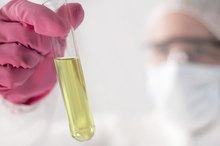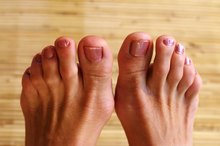What does fact checked mean?
At Healthfully, we strive to deliver objective content that is accurate and up-to-date. Our team periodically reviews articles in order to ensure content quality. The sources cited below consist of evidence from peer-reviewed journals, prominent medical organizations, academic associations, and government data.
- National Library of Medicine: Creatinine
- National Kidney and Urologic Diseases Information Clearinghouse: Kidney Disease of Diabetes
The information contained on this site is for informational purposes only, and should not be used as a substitute for the advice of a professional health care provider. Please check with the appropriate physician regarding health questions and concerns. Although we strive to deliver accurate and up-to-date information, no guarantee to that effect is made.
How to Lower Creatine Levels for Chronic Kidney Patients
Creatine is a naturally occurring amino acid that is stored in muscle tissue for energy. According to the National Library of Medicine, when creatine is metabolized, a byproduct called creatinine is formed, which is then eliminated from the body through the kidneys 1. Those who suffer from chronic kidney disease have impaired kidneys, which results in the inefficient removal of blood toxins like creatinine. When toxins build up in the blood, severe health complications can occur, including fatigue due to anemia, water retention and even kidney failure. To reduce creatine and creatinine levels in the blood, several steps must be taken to improve the outcome for patients with chronic kidney disease.
If you are experiencing serious medical symptoms, seek emergency treatment immediately.
Know Your Numbers
Get a physical. Make an appointment with your doctor to get a routine physical. Part of this physical will include a blood test to measure your kidney function, among other things.
Kidney's Function Related to the Circulatory System of the Human Body
Learn More
Consult with your doctor. After your physical and the lab test results are in, discuss with your doctor an appropriate medical plan.
Know your creatinine 12. Your lab results will give you information about the amount of creatine in your blood. According to LabTestsOnline.com, blood tests include blood creatinine, creatinine clearance, BUN/creatinine ratio and protein/creatinine ratio 2. All these tests give you information about your kidney function. Make an effort to understand these numbers and what range is considered normal or abnormal. Make it your goal to get your numbers into the normal range.
- Make an appointment with your doctor to get a routine physical.
- All these tests give you information about your kidney function.
Control Your Blood Pressure
How Does Creatine Affect the Kidneys?
Learn More
Check your blood pressure. According to the National Kidney and Urologic Diseases Information Clearinghouse, high blood pressure can lead to chronic kidney disease and vice versa, which can cause high blood creatinine levels 1.
Get a prescription. If you have high blood pressure, talk to your doctor about medications to control it. Common blood pressure medicines include angiotensin converting enzyme, or ACE, inhibitors or angiotensin receptor blockers, or ARBs.
Monitor your blood pressure. Sufferers of chronic kidney disease should carefully monitor their blood pressure because it can cause more damage to the kidneys, resulting in an increase of dangerous blood toxins like creatinine.
- Check your blood pressure.
- Sufferers of chronic kidney disease should carefully monitor their blood pressure because it can cause more damage to the kidneys, resulting in an increase of dangerous blood toxins like creatinine.
Maintain a Healthy Lifestyle
Stop smoking. If you are a smoker, you need to stop now. Smoking significantly increases your blood pressure, which can further damage your kidneys and leave elevated levels of toxins in your blood.
Eat a low-protein diet. Foods rich in protein, like meat, fish and beans, should be limited to reduce the buildup of blood toxins like creatinine. Instead, incorporate more fruits, vegetables and whole grain foods into your diet to replace the high-protein foods.
Reduce your cholesterol. Cholesterol contributes to hardened arteries, which can increase blood pressure and damage your kidneys. Focus on low-fat foods in your diet to lower your cholesterol to healthy levels.
Tips
Always follow your doctor’s recommendations. Should you have any doubt about your medical plan, seek a second opinion from another qualified professional.
Warnings
Don’t ignore your treatment plan. Failure to follow all recommendations could end up in complete kidney failure and even death.
- If you are a smoker, you need to stop now.
- Smoking significantly increases your blood pressure, which can further damage your kidneys and leave elevated levels of toxins in your blood.
Related Articles
References
- National Library of Medicine: Creatinine
- LabTestsOnline.com: Creatinine
- National Kidney Foundation. Tests to Measure Kidney Function, Damage and Detect Abnormalities.
- National Kidney Foundation. Tests to Measure Kidney Function, Damage and Detect Abnormalities.
- Kildow BJ, Karas V, Howell E, et al. The Utility of Basic Metabolic Panel Tests After Total Joint Arthroplasty. J Arthroplasty. 2018;33(9):2752-2758. doi:10.1016/j.arth.2018.05.003
- National Institute of Diabetes and Digestive and Kidney Diseases. Glomerular Diseases. Updated April 2014.
- National Kidney Foundation. Acute Kidney Injury (AKI).
- National Kidney Foundation. 5 Drugs You May Need to Avoid or Adjust if You Have Kidney Disease.
- University of Rochester Medical Center. Creatinine (Blood).
- University of Rochester Medical Center. Creatinine Clearance.
Tips
- Always follow your doctor’s recommendations. Should you have any doubt about your medical plan, seek a second opinion from another qualified professional.
Warnings
- Don’t ignore your treatment plan. Failure to follow all recommendations could end up in complete kidney failure and even death.
Writer Bio
Chris Bjorklund has been writing professionally since 2004 and has been primarily featured in peer-reviewed scientific journals such as "Nucleic Acids Research" and "Biochemistry." He has also been anonymously published as a content freelancer for several websites. He completed his doctoral degree in biochemistry at Washington State University in 2006.









